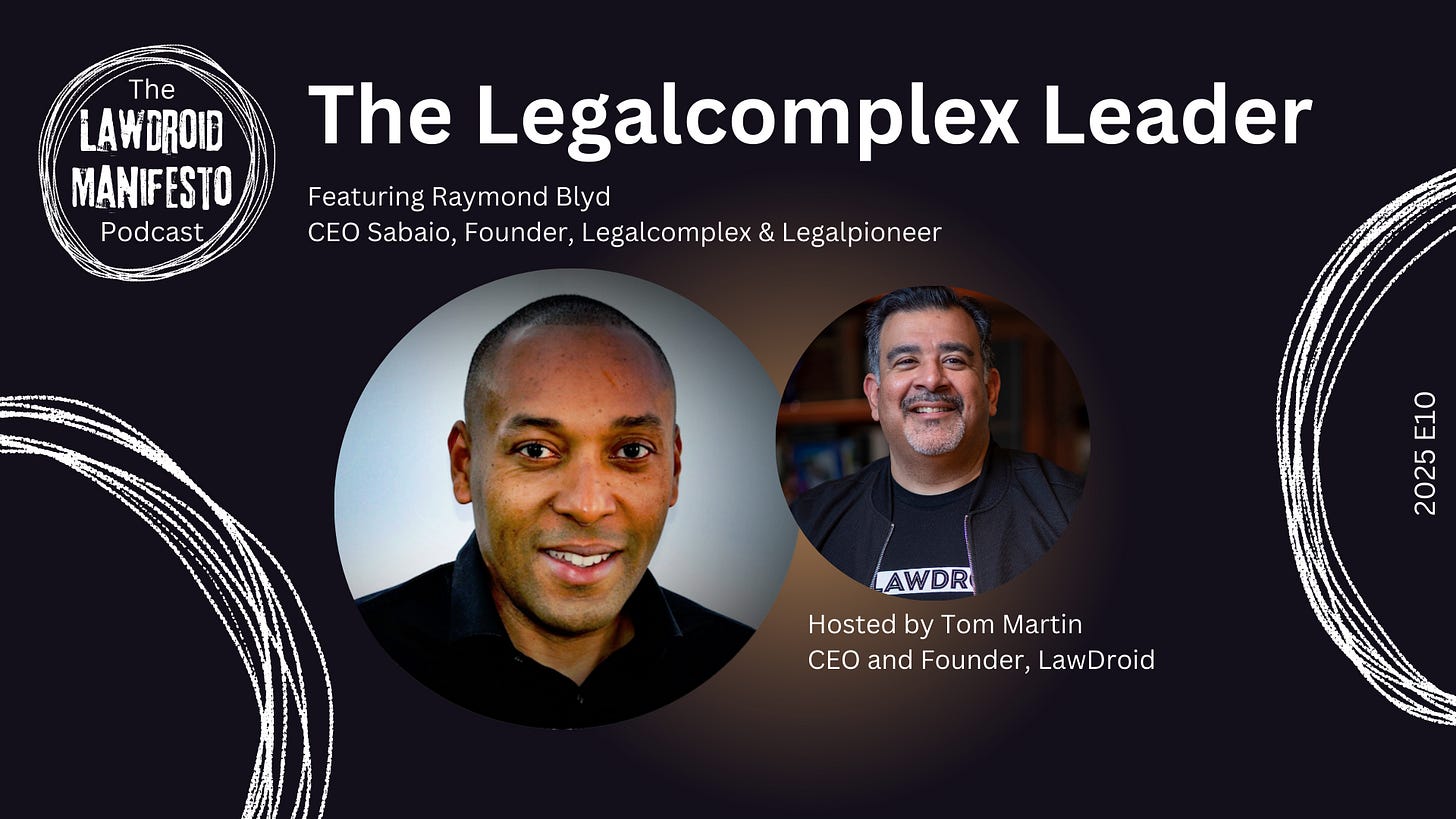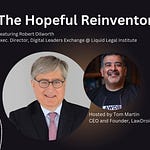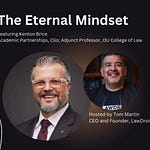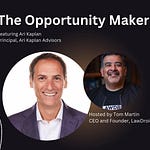Hey there Legal Rebels! 👋 I'm excited to share with you the 10th episode of the 2025 season of the LawDroid Manifesto podcast, where I will be continuing to interview key legal innovators to learn how they do what they do. And, I think you're going to enjoy this one!
If you want to understand the evolving landscape of legal technology, the challenges of building legal tech ventures, and the profound impact AI is having on the legal profession, you need to listen to this episode. Raymond has been at the forefront of legal tech innovation for decades and brings unique insights about where the industry is heading and why some ventures succeed while others fail.
Navigating the Future of Legal Tech in the Age of AI
Join me as I interview Raymond Blyd, founder of Legalcomplex, Legalpioneer, and Sabaio, who recently made waves by announcing the closure of his ventures.
In this thought-provoking episode, Raymond shares his remarkable journey from growing up in Suriname to becoming a pioneer in legal technology. He reveals how his early fascination with computers led him to specialize in legal knowledge system engineering at a time when the field was still in its infancy. Raymond offers candid insights about his transition from Wolters Kluwer to entrepreneurship, the challenges of selling legal tech solutions, and his recent decision to close his ventures.
Perhaps most valuably, Raymond provides a clear-eyed assessment of how AI is transforming the legal profession and the existential questions this raises for law firms. His perspective on the economics of AI adoption in legal practice and the tension between buying versus building AI solutions is essential listening for anyone in the legal industry navigating this rapidly changing landscape.
The Skinny
Raymond Blyd, founder of Legalcomplex, Legalpioneer, and Sabaio, discusses his unique background and journey in legal tech, from his early days programming on a Commodore 64 to specializing in legal knowledge system engineering. After years at Wolters Kluwer, Raymond ventured out on his own, creating data analytics platforms and later focusing on private AI solutions for the legal industry. In this episode, he candidly shares why he recently decided to close his ventures, offering valuable insights about the economics of AI in the legal space, the challenges of hardware costs, and the existential questions AI poses for the future of legal practice. Raymond explains his belief that while AI will transform many aspects of legal work, the emotional and subjective dimensions of law will remain uniquely human.
Key Takeaways:
Law firms may be overestimating their ability (not willingness) to spend on AI, as they face both margin pressures and unexpected hardware costs for running sophisticated AI models
The legal industry is paying premium prices for AI solutions, creating a paradox where lawyers need AI to stay competitive while simultaneously making parts of their work obsolete
Raymond believes that while AI will transform routine legal tasks, the subjective and emotionally complex aspects of law will remain the domain of human lawyers
Building in-house AI solutions presents significant challenges for law firms, including hardware costs and maintaining technical talent
Private, local AI solutions offer advantages in data sovereignty and avoiding token-based pricing, but come with high initial infrastructure costs
Raymond's data analytics experience gave him early insight that AI would eventually outperform his own services, influencing his decision to close his ventures
Personal insights about introversion and entrepreneurship reveal that successful legal tech founders often need to partner with more extroverted personalities to drive adoption
Notable Quotes:
"I think we overestimate how much law firms are able to spend, not willing to spend, able to spend. I think their margins are also under pressure at the moment." - Raymond Blyd (00:02:52-00:03:09)
"The first written text that we found were laws. So those were lawyers that adopted this new stone technology." - Raymond Blyd (00:24:45-00:24:58)
"AI will solve all cognitive problems which it has data on and that have an objective outcome. Legal in general...the really tough legal questions are all subjective." - Raymond Blyd (00:29:53-00:30:10)
"This is the literal definition of a paradox for lawyers. They need it, but they also know that in needing it, they will also make themselves obsolete in a certain way." - Raymond Blyd (00:44:02-00:44:15)
"I would say that even though what you're being taught at school at the moment...don't get too attached to what you learn because it will not be that valuable once you're in the market and trying to do something." - Raymond Blyd (00:47:15-00:47:37)
Clips
Raymond’s Journey with Computers
Lawyers as Early Technology Adopters
The Emotional Component of High-Stakes Legal Work
The Hardware Cost Reality of AI in Law Firms
Where AI Can’t Replace Lawyers
Raymond's journey through legaltech spans decades, from his early fascination with computing to pioneering work in legal knowledge systems, and finally to his data-driven ventures. His decision to close his companies reflects a clear-eyed assessment of how AI is transforming the economics of legal tech. He offers a nuanced perspective on AI's future in law: while it will revolutionize much of legal practice, the emotionally complex and subjective dimensions of legal work will remain uniquely human. His insights about the hardware costs of AI adoption and the "build versus buy" dilemma facing law firms are particularly valuable for anyone navigating this rapidly evolving landscape.
Closing Thoughts
What struck me most about my conversation with Raymond was his ability to see the bigger picture. Having built a database of nearly 30,000 legal tech companies and tracked their trajectories, Raymond possesses a rare vantage point on our industry. His decision to close his ventures wasn't made from a position of failure, but from a position of foresight.
The paradox he articulated for law firms, needing to adopt AI while understanding it may make aspects of their work obsolete, perfectly captures the existential question facing our profession. I believe his insight that the emotional and subjective dimensions of legal work will remain human territory offers both comfort and direction for how lawyers should position themselves for the future.
Raymond's experience with the hardware costs of AI implementation also serves as a valuable reality check for firms considering the build-versus-buy question. As we navigate this transformative period, perspectives like Raymond's that combine technical expertise with industry wisdom are invaluable. I'm grateful he shared his journey with us, and I believe the lessons from his experience will help many of us make more informed decisions about our own paths forward in legal innovation.
By the way, as a LawDroid Manifesto subscriber, I’d like to invite you to an exclusive event…
What: LawDroid AI Conference 2025
Day 1 - 7 panel sessions, including top speakers like Ed Walters, Carolyn Elefant, Bob Ambrogi, and Rob Hanna—they’re well familiar with how to harness AI as a force multiplier.
Day 2 - It will also feature 3 hands-on workshops from AI experts and demos from over a dozen legal AI companies where you can discover the latest and greatest technology to get you ahead.
Where: Online and Free
When: March 19-20, 2025, 8am to 5pm PT
How: Register Now!
Click here to register for free and secure your spot. Space is limited. Don’t risk being left behind.
Cheers,
Tom Martin
CEO, LawDroid
P.S. Check out the Day 1 & Day 2 schedule—packed with panels, workshops, demos, and keynotes from the industry’s leading experts.













